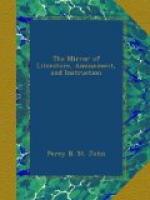* * * * *
SONNET.
TO H——C. ON MY FRIEND H—— S—— BEING IN LOVE WITH HER.
(For the Mirror.)
Thou that art like the sun, that on its
way,
Across the cloudless distance of the skies
Gives pleasure to us all—no
rivalries
Lessen’ng the love we bear it—as
a day
Of shower-glad April or the month of May,
Thou that art cheerful—see
yon youth that lies
Weeping for want of sunshine from thine
eyes,
And hope that thou canst only give him—say:
“Sweet youth, and art thou weeping
for a heart
All passion, joy, and gladness—come
unto me,
Oft by the evening sunset thou shalt woo
me,
And as thou hast the gentleness and art
Or rather truth-kind nature thou mayst
tear it
From all its other likings, win and wear
it.”
J.H.H.
* * * * *
MRS. HEMANS.
(To the Editor.)
I have just been perusing in No. 16, of Chambers’s Edinburgh Journal, a short and incorrect sketch of that highly-gifted and moral poetess, Mrs. Hemans, “who,” the writer says, “first came into public notice about twelve or fourteen years ago;” whereas, her literary career commenced as far back as the year 1809, in an elegantly printed quarto of poems, which were highly spoken of by the present T. Roscoe, Esq. and were dedicated by permission to his late Majesty, when Prince Regent. Permit me to say that this accomplished daughter of the Muse is a native of Denbighshire, North Wales, and was born at the family mansion named “Grwych,” about one and a half mile distant from Abergele; and at the period of her first appearance as an authoress, she had not, I think, reached her thirteenth year. I had the pleasure of then being her neighbour, and our Appenine mansion, the Signal Station, at Cave Hill, has been more than once enlivened by Lady, then Miss Felicia Dorothea Browne’s society, accompanied by her excellent mother. She has since married —— Hemans, Esq., then an Adjutant in the army. A great number of her pieces have appeared in the Monthly Magazine, as well as the New Monthly, and although a pleasing pensiveness and sombre cast of mind seem to pervade her beautifully mental pictures, she was, I may say, noted in her youth for the buoyancy and sprightliness of her conversation and manner, which made her the delight and charm of every society with which she mixed. She likewise (I think in the same year) published an animated poem upon the valour of Spain and her patriotic ally, England. Instead of Mrs. H. residing, as the writer of the above memoir observes, chiefly in London, she has passed the principal years of her life since her removal from Grwych, at a pleasant dwelling, termed “Rose Cottage,” near the city of St. Asaph. The Editor of the Edinburgh Journal is again wrong in saying that her “Songs of the Affections,” and the “Records of Woman,” are understood to have had a very limited circulation, whereas, in the space of two years, they have reached a third and fourth edition.




